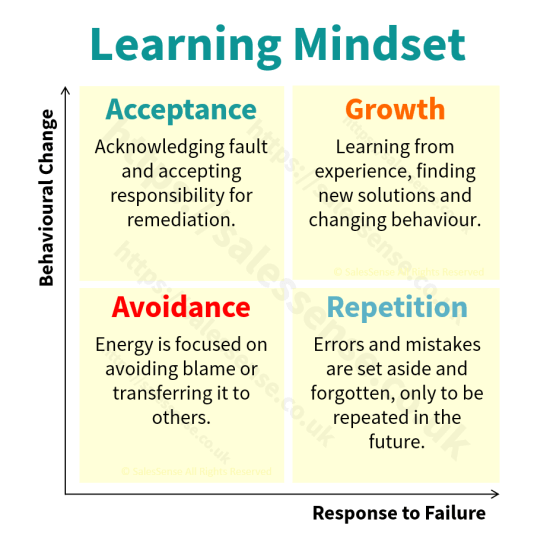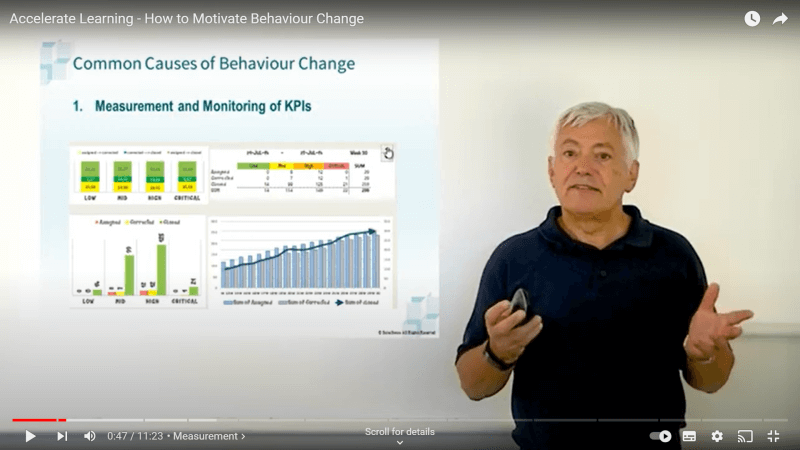The need for motivating behaviour change is too often overlooked.
Acquiring new knowledge, know-how, and skills is just the beginning of the journey. Old ways hinder the adoption of new methods. Motivating behaviour change demands forethought, planning, and preparation.
This is part three of a short series of articles and videos that accelerate learning and behaviour change.
Making use of learning depends on changing behaviour. If we don’t do something differently, we cannot hope to benefit from the learning.
The following common causes of behaviour change reveal ways that learners can motivate themselves to take advantage of their learning.
Managers and learning professionals can leverage the same sources of motivation to support learner efforts and increase the impact on results.
The first of our common causes of behavioural change is:
1. Measurement and Monitoring of KPIs
If something is not measured, it can’t be managed.
If you don’t measure the things you do, you won’t know if you are doing things consistently.
Without monitored measurements, you won’t know which things are contributing most to your results.
Time and time again, research has shown that people’s perceptions are unconsciously biased. Without measurement, we mislead ourselves.
Measurement provides accurate feedback that commands our attention. It provides a score sheet that spurs action to do more of what works.
To motivate change, measure and monitor the impact of the desired behaviour.
Examples of key performance indicators in selling include:
- The number of prospective customer ‘contact events’ achieved each day, week, or month.
- A weekly record of the ‘contact event’ to ‘sales opportunity’ conversion ratio.
- A monthly record of the ‘contact event’ to ‘closed sale’ ratio.
- Average sale value.
- Opportunity pipeline value.
There are many more.
2. Peer Pressure
When KPI measurements are shared or leaked, performance is judged by peers. It is unavoidable. If the data becomes known, people can’t help forming opinions about the individual results.
We are eager to know how our performance compares with that of our peers and others in similar situations.
So if key performance indicators for individuals are shared, peer pressure is accentuated.
3. Changing Priorities

If you don’t have a plan, your priorities are being set by someone else.
Make a plan and set the priorities that will motivate the behaviours that you want to adopt.
All quota-carrying salespeople should have a sales target achievement plan that details how they will achieve their sales target.
Which priorities should you adopt to motivate the habitual adoption of desired behaviours?
For example, you could prioritise one of these three sales aims above the other two:
Work to increase the number of opportunities,
or concentrate on increasing the average order value,
or persuade customers to buy more often.
4. Mistakes
We are our own worst critics. We are first to blame ourselves when anything goes wrong.
It is natural to try and deflect blame yet merely thinking, “How can I avoid the blame?”, is an acknowledgement that we think ourselves culpable.
Mistakes are pondered over and revisited long after everyone else has forgotten them.
The endless review and ‘what if’ thinking rewrites how we will react to similar circumstances.
What doesn’t kill us, makes us stronger.
“Fail forward faster,” wrote Tom Peters.
Accepting responsibility is not the same as accepting the blame.
If you are responsible for something that went badly wrong, your duty is to ensure it doesn’t happen again.
5. Choice
It should be true that when we have learned a better way to do something, we automatically make use of the new learning.
Unfortunately, this is often not the case.
Whatever people do repeatedly, becomes habitual and we hold on to habits.
The new way represents risks.
We might not be able to do it.
It might lead to a worse result.
The old way feels more comfortable.
“The chains of habit are too light to be felt until they are too strong to be broken,” wrote Samuel Johnson
It may be necessary to invest more than the usual amount of forethought, planning, and preparation to begin doing something differently.
We may need to be more persistent to establish a new habit and avoid falling back into the old and familiar practice.
Adopting a new way of doing something, merits a written plan.
Declare what you intend to accomplish as a result of the change
Note any necessary preparation and the steps involved in using the new learning and then schedule the actions.
6. Reflection and Review
When you set aside time to review a plan and the actions it entails, you will find ways to improve it.
For evidence, think of any piece of work, writing, or presentation that by chance or design, you have repeatedly reviewed and revised.
Did your work improve with each reconsideration? I know that mine does.
General Eisenhower who led the D-Day invasion in the Second World War, leveraged this principle so much that his staff began complaining.
He said in response, "In preparing for battle I have found that plans are useless, but planning is indispensable!”.
7. Required Procedures
Complex and difficult tasks are best achieved through careful preparation and rigorous execution of procedures.
Situations that benefit from carefully considered procedures include:
- Defusing a bomb
- Carrying out pre-flight checks
- Aircraft maintenance
- Extinguishing a major fire
If failure to complete a vital step would be catastrophic, then it is appropriate to publish and enforce a required procedure to prevent or minimize costly mistakes.
The degree of enforcement is usually related to the cost of a mistake.
In your environment, what situations and practices should be governed by procedures and enforced by sanctions?
High-stakes sales opportunities fall into this category.
When unrecoverable resources must be committed to win high-value business, the risk and consequences of failure warrant a greater level of diligence and governance.
Providing there is sufficient will to communicate, mandate and enforce a procedure, people will change what they do to conform.
8. Changed Attitudes
Altitude is a function of attitude rather than aptitude. Perhaps you have heard this before.
In other words, success or how high you fly depends more on mindset than ability.
A change of attitude can happen in a moment. It is like opening a door and seeing an entirely unexpected vista.
Having resilience and persistence in the face of setbacks is more important than having talent or skills.
Willingness to build bridges rather than shut doors, to be open to possibilities rather than closed to contrary perspectives, and to create value regardless of return are examples of attitudes that are difficult to nurture.
Changed attitudes are like new horizons. They reveal unexpected opportunities.
If you are stuck for motivation, experiment with new attitudes.
9. Changed Beliefs
If you know what to do and resolve to do it yet don’t take the intended action, you may be harbouring conflicting or contradictory beliefs.
Beliefs are often deep-seated and resist change, yet they are not fixed aspects of personality.
If you change what you believe to be true, you become motivated to change your behaviour so that it reflects your new beliefs.
Just as events can change our beliefs, people can choose to believe different things.
Once we make a new assertion, we can begin gathering evidence for its validity.
If you want to change behaviour, examine and dismantle beliefs that sustain unwanted actions and develop or strengthen beliefs that motivate desired actions.
10. Perceived Threats
Management by fear has been shown to be less effective than management by consent. Those motivated by fear do not perform as well as those motivated by their own or a shared purpose.
Yet decisions by others, external events, unanticipated problems, and other factors that cannot be controlled, constitute threats that influence behaviour.
For a threat to have more power, all that is required is for people to give it more attention.
11. Trauma
Uncomfortable, painful, and traumatic events force review and contemplation. They provoke strong feelings and motivate change.
Of course, no one wants to deliberately experience a trauma such as losing a job, getting demoted, causing a significant loss of money, or being responsible for the loss of any valued possession or resource.
Yet traumatic events do cause people to change how things are done.
Trauma is often a consequence of ignoring real threats.
Video Presentation by Clive Miller
Take Action to Use These Leavers
Arrange a call with me for more ideas and resources specific to your situation.
if you need to change behaviour to take advantage of new learning, find the leverage that will work for you or that will support the efforts of your team members.
Links, tools, and templates associated with this presentation help drive learning adoption and motivate behaviour change.
Other resources:
- Sales Target Achievement Plan Template (available on request)
- Work Motivators Assessment Workshop
- Work Motivators Assessment
If you need to do things differently or have staff embrace new methods, we can help you find ways of motivating behaviour change. Telephone +44 (0)1392 851500. We will be pleased to learn about your needs or talk through some options. Alternatively, send an email to custserv@salessense.co.uk for a prompt reply or use the contact form here.













